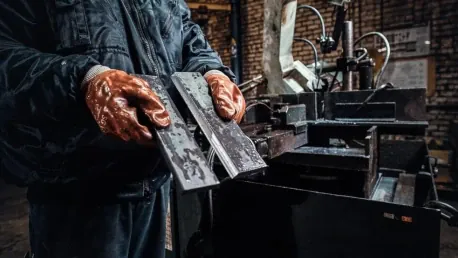The manufacturing landscape in Africa is undergoing a tremendous shift, largely due to the adoption of advanced metal cutting machines. These technological innovations are not only modernizing various sectors like automotive, construction, and general manufacturing but also enhancing the continent’s industrial competence, leading to significant economic growth and development. By leveraging cutting-edge technologies such as CNC laser cutters, plasma cutters, and waterjet cutters, African manufacturers are achieving unprecedented levels of precision and efficiency that align with global standards. This shift is particularly vital as Africa aims to establish itself as a formidable player in international supply chains.
High-precision metal cutting techniques are laying the groundwork for elevated output quality and operational efficiency across critical industries. Traditional metal fabrication practices often resulted in inefficiencies and inferior product quality, hampering the continent’s industrial competitiveness. However, with the introduction of advanced metal cutting machines, African manufacturers now have the tools to enhance productivity and minimize waste. These innovations are facilitating the continent’s industrial modernization, ensuring that local industries can meet international standards and reduce dependence on imported goods. Overall, Africa’s adoption of these advanced technologies is fostering economic growth and opening new avenues for industrial development.
The Essence of Metal Cutting Machines in Industrial Modernization
Precision and efficiency are at the heart of metal fabrication, especially in high-stakes sectors like automotive, aerospace, and construction. Historically trailing behind global manufacturing leaders, Africa now finds itself with an opportunity to leapfrog thanks to advanced metal cutting machines. These technologies enable higher accuracy, speed, and efficiency, factors critical for industries aiming for global competitiveness. The importance of precision cannot be overstated. In automotive manufacturing, for instance, the need for exact cuts and minimal material waste is paramount. Laser cutters using CNC technology ensure consistent production quality, an essential aspect for Africa’s ambitions to enter global supply chains decisively. African industries can now meet international standards, thus reducing their dependence on imports and enabling local production.
These advanced metal cutting machines are democratizing African manufacturing by providing access to technologies that were once predominantly available in more developed regions. This accessibility is driving a wave of industrial innovation across the continent. Precision cutting not only assures higher-quality products but also allows for greater design flexibility and the ability to produce complex geometries that were previously difficult or impossible to achieve with traditional methods. Moreover, the efficiency gains from these technologies contribute to lowered production costs, making African goods more competitive on the global stage. The cumulative effect of these advancements is a revitalized manufacturing sector that can support the continent’s broader economic aspirations.
Technological Innovations Driving the Shift
Laser Cutting Technology
Laser cutting machines have gained popularity for their ability to cut intricate shapes with extreme precision. They are ideal for thin sheet metals like steel, aluminum, and stainless steel. The incorporation of CNC technology has automated production processes, significantly improving productivity and lowering labor costs. Additionally, by minimizing material waste, laser cutting helps tackle the issue of high raw material costs, making it a sustainable choice for manufacturers. These machines are particularly suited for industries that require detailed and complex part fabrication, such as automotive and aerospace. The ability to produce high-precision components consistently enhances the quality and reliability of finished products.
Laser cutting technology also offers unparalleled speed and flexibility, enabling manufacturers to quickly adapt to changes in design specifications. This agility is crucial in a competitive market where time-to-market can be a decisive factor. Furthermore, the automation enabled by CNC technology allows for continuous operation with minimal human intervention, reducing the potential for errors and increasing overall efficiency. As a result, industries that adopt laser cutting technology can achieve faster production cycles and higher throughput, further solidifying their positions in both local and global markets.
Plasma Cutting Solutions
Plasma cutting is versatile and cost-effective, making it highly suitable for sectors requiring precision in thicker metals. It is particularly favored in mass production environments for its speed and efficiency. Plasma cutters, especially those with mechanized systems and CNC controls, are transforming manufacturing processes by providing robust solutions for quick and accurate metal part production. This technology is indispensable in industries like construction and heavy equipment manufacturing, where the ability to cut through thicker materials quickly and accurately is essential. The evolution of plasma cutting technology has made it more accessible to African manufacturers, enabling them to compete on equal footing with global counterparts.
One of the key advantages of plasma cutting is its ability to handle a wide range of materials and thicknesses, from thin sheet metal to heavy steel plates. This versatility makes it a go-to solution for various applications, from constructing steel frameworks to manufacturing industrial machinery. The integration of CNC control systems further enhances the precision and efficiency of plasma cutting, allowing for intricate designs and consistent quality. By adopting plasma cutting technology, African manufacturers can significantly improve their production capabilities, reduce lead times, and meet the stringent requirements of international markets.
Waterjet Cutting Machines
Waterjet cutting technology, which employs a high-pressure stream of water mixed with abrasives, is essential for cutting materials sensitive to high temperatures, such as titanium. This methodology avoids creating heat-affected zones, thereby preserving the material’s integrity. It’s highly prized in aerospace and precision engineering sectors across Africa, where maintaining material properties is crucial. The ability to cut without generating heat or mechanical stresses ensures that the structural and metallurgical characteristics of the material remain intact, which is vital for high-performance applications.
Waterjet cutting technology also offers remarkable versatility, as it can cut a wide variety of materials, including metals, glass, ceramics, and composites. This capability allows manufacturers to diversify their product offerings and explore new market opportunities. Additionally, the precision and cleanliness of waterjet cuts reduce the need for secondary finishing operations, saving both time and money. By embracing waterjet cutting technology, African industries can achieve higher standards of quality and efficiency, positioning themselves as leaders in advanced manufacturing.
Automation and Smart Manufacturing
The integration of automation in metal cutting processes is revolutionizing African manufacturing. Smart manufacturing solutions, including IoT-enabled CNC machines, allow real-time monitoring and control of production metrics. This capability optimizes production processes, minimizes downtime, and ensures consistent quality. Automation is vital for African manufacturers aiming to achieve a competitive edge in international markets. The ability to collect and analyze data in real-time enables manufacturers to make informed decisions, improve operational efficiency, and identify areas for further optimization. By implementing smart manufacturing technologies, African industries can enhance their responsiveness to market demands and reduce operational costs.
Automation also plays a crucial role in improving workplace safety by minimizing the need for manual intervention in potentially hazardous processes. This not only protects workers but also reduces the risk of production halts due to accidents or human error. Moreover, IoT-enabled machines can be integrated into larger, connected manufacturing ecosystems, enabling seamless coordination across different stages of the production process. This level of connectivity and automation empowers African manufacturers to operate at a higher level of sophistication, comparable to their international counterparts.









